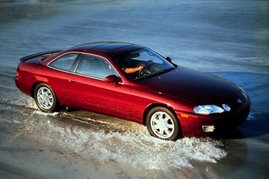 It's not often that I end up reviewing an album which was released fifteen years ago, but I feel compelled to write a review expressing my affection for Tom Cochrane's 1991 album: "Mad Mad World".
It's not often that I end up reviewing an album which was released fifteen years ago, but I feel compelled to write a review expressing my affection for Tom Cochrane's 1991 album: "Mad Mad World".This was and still is one of Tom Cochrane's most influential albums. It remains in the Canadian music history book not only for it's super song composition (both musically and lyrically) but because it was the album in which Cochrane broke away from "Red Rider".
By the time the late 80's arrived "Tom Cochrane and Red Rider" were already known as a staple among Canadian rock music. The group originally formed in Toronto had already been given numerous Juno awards and had even garnished a few successful radio hits (hits such as "Lunatic Fringe" and "Boy Inside The Man"). Actually, the self titled album (which arrived in '86), "Tom Cochrane & Red Rider" (thier 6th album I believe) proved as they're most popular and well known album to date.
However, in '88 the group had readily released yet another album and this time they surprised themselves once again. The album titled "Victory Day", was easily their biggest album to date and even managed to make it onto the Billboard Top 100 (although at a peaky 64th). This powerful and exciting album had such hits as "Victory Day", "Big League" and the politically charged "Calling America". All in all "Victory Day" was an amazing album - which makes it all even more surprising when you find out '88 is the year which Tom Cochrane & Red Rider disbanded.
Although when the band seperated it wasn't under extreme rocky circumstances (unlike some), but apparently more at a casual disagreement at where the band's muscial direction should go. For "Mad Mad World", Cochrane had the concept of creating a more gritty, more realistic feeling album dealing with the journey of life.
As a result, "Tom Cochrane and Red Rider" split up and thank God they did. Don't get me wrong, I love "Red Rider", but this solo album is something which could not have been done with them.
Now having seperated from "Red Rider", Tom was faced with the tough task of assembling a new band. Thankfully "Red Riders" bass guitar player (Spider Sinneave) stayed to offer his talents to Tom. Other than that, he leaned upon many new names, but still managed to garnish the help familar faces. Such as his wife, Kathy Cochrane (for backing vocals) and lastly fellow Canadian rocker Kim Mitchell (lead guitar on "Brave & Crazy").
The stage was set, but the end result was uncertain. For starters, Cochrane had to have a song which would serve it's purpose as radio friendly (IE. A single). What was born was one of Canada's most well known rock hits, "Life is A Highway".
Tidbit - It was originally written with the lyrics "Love is a highway".
This fantastic song proved to be Tom's biggest hit he had ever written and composed. This song hit unknown success for Cochrane when it it hit 6th place on the Billboard Singles Top 100 chart.
"Life Is A Highway"
The video by the way, was shot in Drumheller Alberta =)
Mind you, as fantastic and catchy "Life is A Highway" was, it was far from the best song on the album. Meanwhile Cochrane's other "single" release, "No Regrets" was received highly well earning 28th place on the Billboard Top 100 singles chart. "Sinking Like A Sunset" also quickly became a radio friendly hit and a fan favourite.
"No Regrets"
Mind you, the further you dug into "Mad Mad World" the more delicious and addictive it became. While with "Red Rider" Cochrane had long given up the use of synthesizers and whatnot, MMW sported an aggression and tension which no previous album he had worked on featured. Previous "Red Rider" albums could had been labeled "rock", but MMW intelligently combined "rock", "folk" and "light rock" all into one amazing package. Tracks such as "Washed Away" and "Bigger Man" had both been crafted with the idea of an addictive chorus and aimed on the goal of being labeled with a "contemporary/Alternative rock" badge.
On other hand, songs such as the title song ("Mad Mad World"), "Get Back Up" and "Brave & Crazy" were far from contemporary rock - more hard rock, but without being "head banging". I imagine the influence for these three particular songs came from the "grunge" scene which as we know arrived in the '90's. Especially "Get Back Up" which focused on a person overdosing from drug use. With it's intelligent use of acoustic and electric guitars as well as powerful drums it's easily my favourite on this album. I'm surprised it hadn't occurred to me earlier, but MMW reminds me of Rush's "Snakes & Arrows" in more than a few ways.
"Brave & Crazy" as well as "Mad Mad World" focused on the world's problems. Topics including hypocrites, the faltering job market among many other such relevant topics.
Less heavy songs such as "The Secret is To Know When To Stop" and "Everything Comes Around" followed the tradition of contemporary/alternative rock and gave us the Tom Cochrane we all knew and loved.
All in all this album featured songs which were not only more accessible than previous works, but with better song composition. I'd go as far as saying it's not only the best album of 1991, but which Tom Cochrane has ever produced. It's encompasses all which I expect in this great Canadian musician and song writer.
On a side note of '90's Canadian rock albums: Rush also released an album in 1991 ("Roll The Bones"). God knows I'm a huge Rush fan, but you know what? "Mad Mad World" kicks "Roll The Bones" in the ass (in all ways). And even when compared to Rush's '93 release ("Counterparts") "Mad Mad World" stills remains strong.
It's as good as "it" gets - 10/10
Tidbit: Alex Lifeson (Rush guitarist) played the role of an guest guitarist on Cochrane's 1995 album, "Ragged Ass Road"










No comments:
Post a Comment